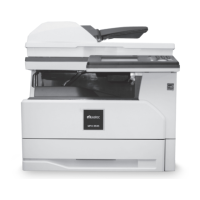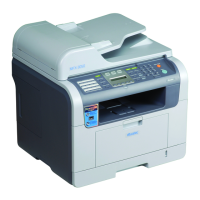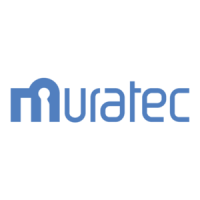Do you have a question about the Muratec MFX-3550 and is the answer not in the manual?
Explains the meaning of all icons and signs used in the user's guide, categorized by danger level.
Details warnings and precautions for the machine's operating environment to prevent injury or damage.
Provides cautions for operating the machine safely during printing and handling paper.
Offers safety guidelines for installing and moving the machine, including environmental considerations.
Certifies the printer's compliance with laser safety standards like DHHS 21 CFR and IEC 825.
Provides information on ozone production during operation and mercury disposal requirements.
Guides on correct disposal of the product (WEEE) and batteries according to regulations.
Details FCC and Canadian regulations regarding radio frequency emissions and user compliance.
Covers FCC statements for wireless LAN use, RFID, and general intentional emitters.
Provides instructions and warnings for replacing the UK power plug and fuse.
Provides a general overview of the machine, including its components and views.
Explains the functions of each button and display element on the machine's control panel.
Describes the meaning of the Status LED colors and patterns for machine status indication.
Step-by-step instructions for setting up the machine's hardware, including location selection.
Lists the software provided on the CD, including printer drivers and utility programs for various OS.
Specifies the necessary system requirements for Windows, Macintosh, and Linux operating systems.
Guides for installing printer and scanner drivers for Windows, Macintosh, and Linux systems.
Instructions for setting up computers to share the machine locally over a network.
Details the network protocols and operating systems supported by the machine for network connectivity.
Introduces network programs like SyncThru™ Web Service for managing network settings.
Explains how to use SyncThru™ Web Service for machine management and configuration.
Provides instructions for setting up network protocols and connecting via a wired network.
Guides on setting up IP addresses using the control panel or SetIP program for network connection.
Details how to configure wireless network parameters using the control panel or SyncThru™ Web Service.
Explains how to adjust altitude settings to optimize print quality based on atmospheric pressure.
Provides steps to change the language displayed on the machine's control panel.
Guides on setting the machine's date and time for features like delay fax and print.
Instructions for controlling machine sounds like key sound, alarm sound, and speaker volume.
Explains how to enter alphanumeric characters and numbers using the machine's keypad.
Guides on selecting default paper tray and type for printing jobs via control panel or computer.
Guidelines for preparing originals, including paper size and type restrictions to prevent damage.
Instructions on loading originals onto the scanner glass or into the document feeder.
Information on choosing suitable print media and guidelines to avoid problems like paper jams.
Explains how to adjust paper guides to change the tray size for different paper types.
Detailed steps for loading paper into Tray 1, optional tray, and the multi-purpose tray.
Shows available special media for each tray and provides guidelines for printing envelopes and labels.
Overview of standard and special printing features supported by the printer drivers.
General steps for printing documents from various applications on Windows, Macintosh, and Linux.
Instructions on how to access and change print settings through the Printing Preferences window.
Details on features like printing multiple pages per sheet, posters, booklets, and watermarks.
Guides on how to change and save default print settings for future use.
Information on using the PostScript driver for printing, including configuration and preferences.
Instructions for printing from Linux applications using the CUPS system.
Explains the normal and usual procedure for copying originals using the control panel.
Details how to adjust settings like darkness, original type, and zoom for each copy job.
Guides on setting frequently used copy options as default settings.
Instructions for copying two-sided originals onto a single sheet of paper, useful for small items.
Explains how to reduce and print multiple original images onto one sheet of paper.
Guides on setting the machine to print copies on both sides of the paper (duplex printing).
Explains how to set the machine to sort copy jobs or collate output into complete sets.
Details how to scan documents using USB or network connections with Scan Manager, TWAIN, WIA.
Instructions for scanning originals and sending them as email attachments via SyncThru™ Web Service.
Guides for scanning originals and sending them to your computer via USB or network connection.
Instructions for setting up FTP and SMB servers and scanning files to them.
Explains how to set up user authentication for network scanning using SyncThru™ Web Service.
Details on using the Scan Manager program to configure scan settings and manage saved files.
Guides on customizing scan settings like size, resolution, color, and format for each job.
Instructions for scanning documents on Macintosh using Image Capture via USB or network.
Guidance on connecting the machine to a telephone line and setting the fax header.
Step-by-step instructions for sending faxes, including manual sending and using SmarThru Office.
Information on checking transmission status, handling errors, and automatic confirmation reports.
Instructions for setting up delayed fax transmission and adding documents to reserved jobs.
Explains different receiving modes like Fax, Tel, Ans/Fax, DRPD, and manual reception.
Details on activating secure receiving mode to prevent unauthorized access to received faxes.
Guidance on adjusting resolution and darkness settings for optimal fax quality.
Instructions for forwarding sent or received faxes to other destinations via fax, email, or server.
Guides on registering and managing speed dial and group dial numbers for efficient faxing.
Provides information about USB memory devices and their compatibility with the machine.
Instructions for scanning documents and saving them to a USB memory device.
Guides on directly printing files stored on a USB memory device.
Explains how to back up machine settings and address book entries to a USB memory device.
Instructions for deleting image files, formatting the device, and viewing USB memory status.
Details user-selectable options for configuring the fax system, including redial and send report settings.
Explains various receiving modes like Fax, Tel, Ans/Fax, DRPD, and auto reduction settings.
Guides on setting copy options in advance, including resolution, darkness, and duplex print.
Instructions for setting default scan settings for different scan types and jobs.
Guides on printing machine configuration reports, font lists, and various operational logs.
Instructions for selectively clearing stored information like fax setup, copy setup, and address book.
Details on setting up the network, including TCP/IP, Ethernet speed, and wireless configurations.
Provides a comprehensive overview of the menus accessible from the machine's control panel.
Guides on accessing and using SyncThru™ Web Service for machine management via a web browser.
Instructions for setting up email notifications for machine status alerts like toner levels or errors.
Details on using the Smart Panel program for monitoring machine status and changing settings.
Information on starting and using SmarThru Office for features like scanning, printing, and faxing.
Guides on using the Linux Unified Driver Configurator for managing printer and scanner devices.
Instructions for printing machine information and job reports via the control panel or web service.
Steps to find the machine's serial number, useful for service or online registration.
Guidelines for cleaning the machine's exterior, interior, and scan unit to maintain print quality.
Recommendations for storing toner cartridges to ensure optimum performance and lifespan.
Provides tips for safely moving and storing the machine to prevent damage and maintain quality.
Instructions to improve print quality by redistributing toner when it's low or streaks appear.
Step-by-step guides for clearing paper jams from the document feeder and other machine areas.
Tips for preventing paper jams and curls by selecting correct media and loading procedures.
Detailed procedures for clearing paper jams from Tray 1, optional tray, and the multi-purpose tray.
Explains machine status and error messages, providing meanings and suggested solutions.
Troubleshooting steps for common printing issues like no print, wrong text, or poor quality.
Solutions for common copying issues such as light/dark copies, smears, and skewed images.
Troubleshooting tips for issues where the scanner does not work or appears slowly.
Addresses specific printing issues encountered on Linux systems, including driver and port conflicts.
Provides detailed specifications for document feeder, paper input, output, power, and environment.
Details printer performance like speed, resolution, language, OS compatibility, and interface.
Lists scanner compatibility, resolution, scanning methods, and supported file formats.
Provides specifications for copier functions, including speed, resolution, and zoom range.
Details facsimile features such as compatibility, modem speed, transmission speed, and memory.
Lists supported paper types, sizes, dimensions, and capacities for various trays.
Defines Access Point (AP) or Wireless Access Point (WAP) as a device connecting wireless communication devices.
Explains ADF as a mechanism for automatically feeding original sheets for scanning.
Defines Dynamic Host Configuration Protocol (DHCP) for network configuration and IP address allocation.
Describes Ethernet as a frame-based computer networking technology for local area networks (LANs).
Defines MAC address as a unique identifier for network adapters, used for locating machines on networks.
Explains PostScript (PS) as a page description language used in electronic and desktop publishing.
Defines a Printer Driver as a program for sending commands and transferring data to the printer.
Describes TWAIN as an industry standard for scanners and software, enabling scan initiation.
Defines USB as a standard for connecting computers and peripherals, designed for multiple connections.
Explains WPA as a class of systems for securing wireless (Wi-Fi) computer networks.
| Brand | Muratec |
|---|---|
| Model | MFX-3550 |
| Category | All in One Printer |
| Language | English |











